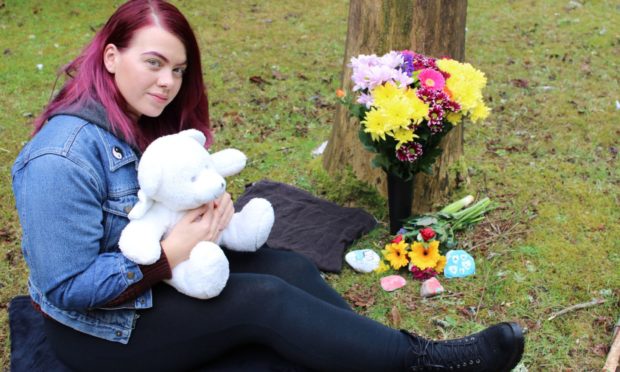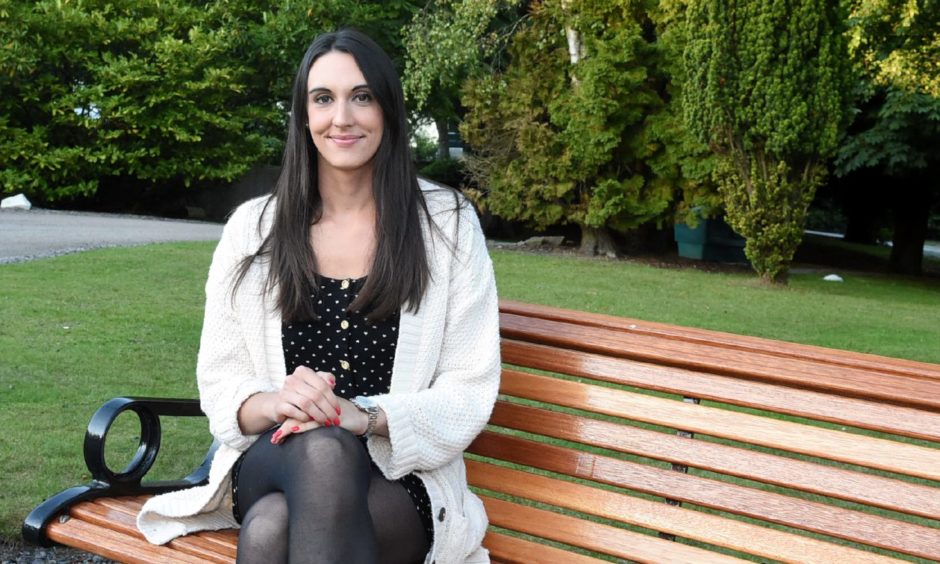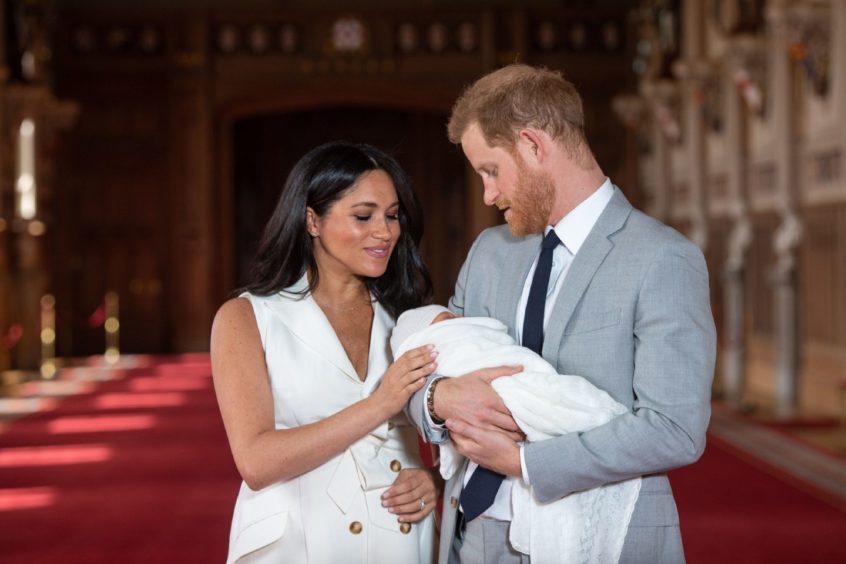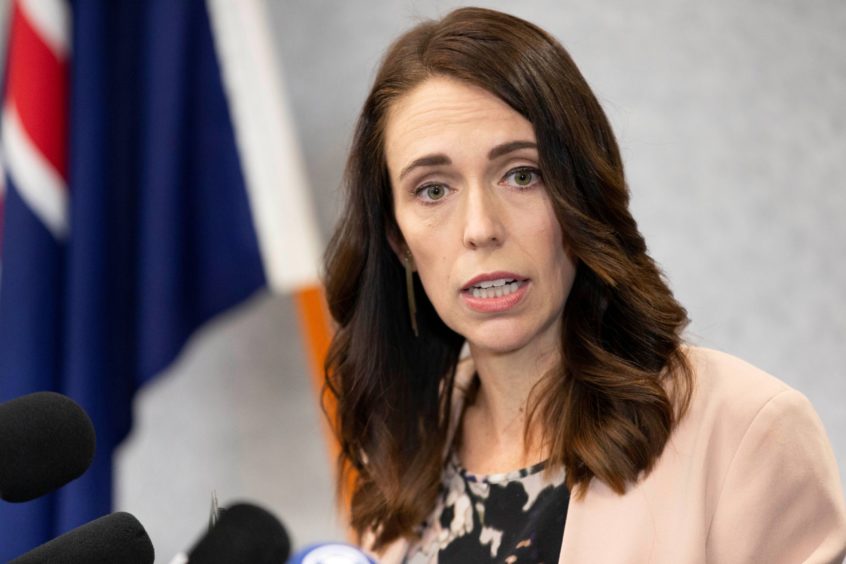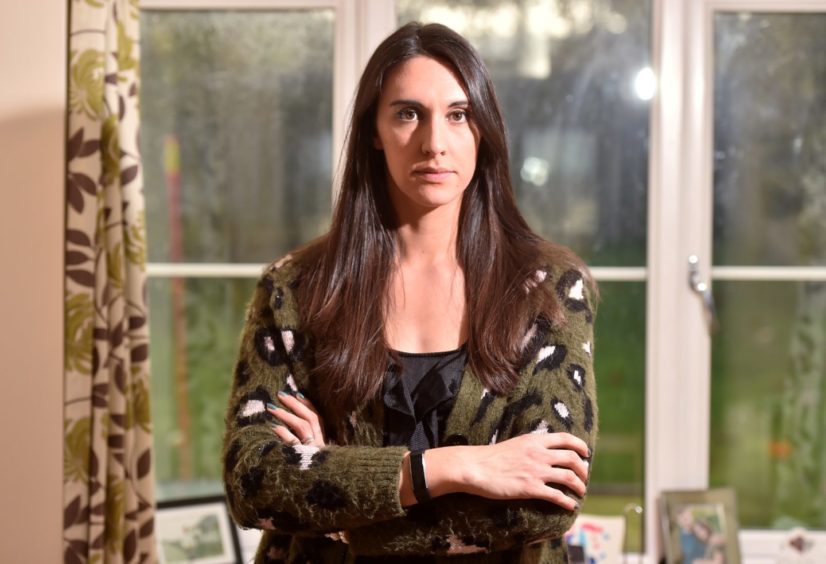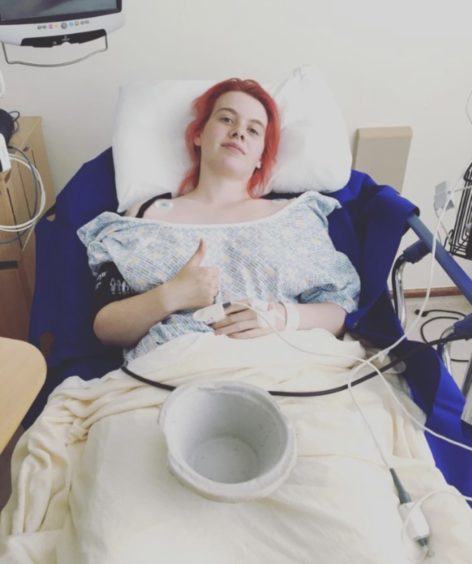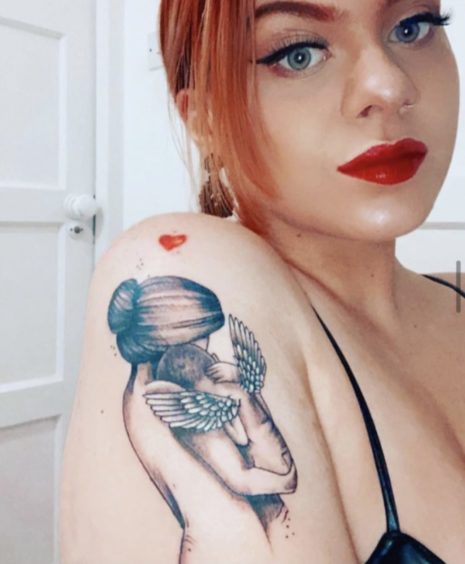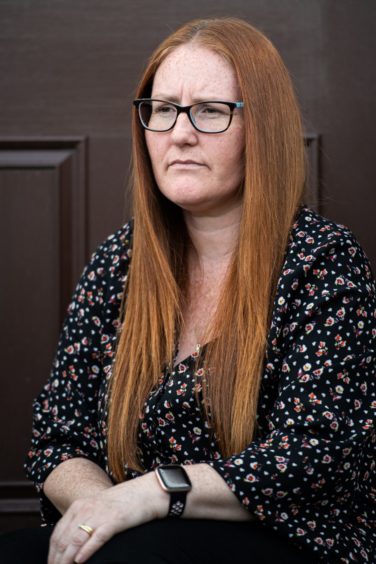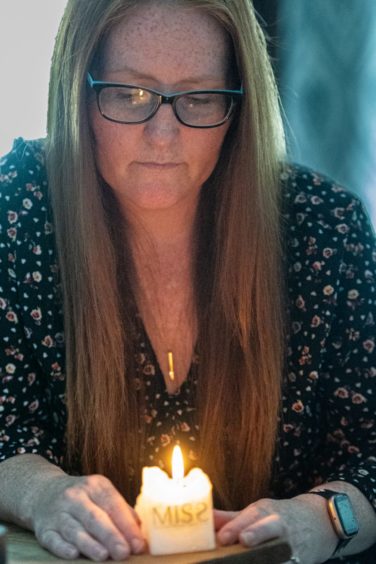It is the unforgiving red stain against a sheet of white toilet paper.
It is the suffocating silence as you stare at the grainy image on a monitor, willing for a flicker of life.
It is one in four.
So why, if miscarriage is so common, do we still struggle to talk about it?
For north-east charity Miscarriage Information Support Service (Miss) there are numerous reasons why both men and women feel unable to open up about their experiences.
Founder Abi Clarke, who had a miscarriage six years ago, is determined that not only will the charity change the conversation, it can also provide invaluable support from the very beginning.
The group has so far helped around 3,000 people since it was set up in 2017, with support on offer ranging from a telephone service to support groups, and special packs handed out to bereaved parents.
There is also hope for an early pregnancy loss memorial garden in Aberdeen, with plans in the early stages.
Although attitudes towards miscarriage have gradually changed in recent years, many people still feel unable to talk about their experience.
The Duchess of Sussex, Meghan Markle, who is expected to give birth to a daughter in the summer, revealed that the Royal couple experienced a miscarriage last year.
Her piece titled “The Losses we Share”, which was penned in The New York Times, saw people open up around the world concerning their own experiences.
And earlier this year, New Zealand’s parliament voted unanimously to give mothers and their partners three days of bereavement leave after a miscarriage or stillbirth.
In the UK , a miscarriage before the end of the 24th week of pregnancy does not qualify for bereavement leave.
There is clearly still much work to be done, for what is an incredibly common but very upsetting experience.
your life spoke with five women who have experienced a miscarriage, in a bid to find out the support on offer, and why changing attitudes may be the way forward.
Abi Clarke, founder and chairperson of Miss
Abi, who lives in Aberdeenshire, is now a proud mum to two children, who are five and three.
But when she fell pregnant for the first time in 2015, she discovered there was very little support available after she miscarried at seven weeks.
“It was my first pregnancy, but when I miscarried I found that there was no one to speak to about it,” said Abi.
“It’s actually one in four women who will experience a miscarriage, but it’s not until you start talking to people that you realise how common it is.
“I wanted to create something where people can come along and talk about what they’ve been through, so they don’t feel alone.
“Our support is available across Scotland.”
Prior to Covid, people were able to attend support groups in person, in both Aberdeen and the Shire.
Miss is also in the early stages of setting up groups in Peterhead and Inverness, and is currently looking for volunteers to become involved.
“Covid has been incredibly difficult, because women have had no support alongside them during a scan.
“Being told you have had a miscarriage can be such a numbing experience, you’re not really taking in what the midwife is saying.”
Abi is hopeful that at some point, more research can be carried out as to why a miscarriage has occurred.
“Some people feel that more answers would be helpful. They want more information as to why this has happened to them,” she said
“I think it could help enormously from a mental health point of view, to know you weren’t to blame.
“Although we are more open, there is still that stigma, should we talk about it or not talk about it?
“That’s what we want to change at Miss, and we have started to break that taboo subject.”
LauraJane Webster: ‘You don’t think it will happen to you’
When carer and photographer LauraJane Webster found out she was expecting her third baby, she was surprised but nonetheless excited.
Her two children are now four and one, and the family, who live in Kincorth, in Aberdeen, started to prepare for the new arrival.
“We picked out one baby item, then told family and friends,” said LauraJane, who is 24.
“We announced it on social media before the 12-week scan, which is something we hadn’t done before. It was in the back of my mind that if anything did happen, I would want people to know so I had the support.”
LauraJane had a small fall down the stairs and attended an early scan, only to be told her dates were wrong as the baby was measuring small.
By the time she returned for what would have been her 12-week scan, she was told there was no heartbeat and given the option of medical or surgical management.
With a traumatic birth history, she opted for medical which involves taking a tablet to induce labour.
“My husband lost his job due to Covid; everything happened at the same time,” she said.
“I don’t think people realise that it’s not like a period, you experience contractions.
“I had to return to hospital to check the pregnancy tissue had come away, but I knew it hadn’t. So the next step was surgical management, which was really hard following two traumatic births.”
LauraJane took to social media to share her experience, and also contacted Miss after seeing posters and leaflets in the hospital.
“I wanted to help other mums by being open. I think it all comes down to the taboo of not telling anyone before the 12-week scan,” she said.
“If you miscarry before reaching that point, no one wants to know.
“Years and years ago, miscarriage was thought to be a woman’s fault.
“I think that’s where it started from, and women are also scared of judgement.
“There is so much judgement, and I’ve had women message me who have never told anyone about their miscarriage.”
Miss has been a huge help to LauraJane and her family, and she has gone on to raise funds for the charity.
“Miss can honestly help you with anything, from support for your partner to support if you fall pregnant again,” she said.
“I couldn’t recommend them enough.”
Anonymous: ‘I only told my husband about my miscarriage’
Attitudes have changed over the passing decades, as proven by one woman’s story from Aberdeenshire.
Now 60, she was faced with a miscarriage in 1999, and only told her husband and six children.
She believes things have changed for the better after a shocking experience, but has chosen to remain anonymous.
“I was 38; we were really happy and excited when I found out I was pregnant,” she said.
“I went for a scan and was told I had my dates wrong, and to return in 10 days.”
After a follow-up scan, a heartbeat was detected and it seemed like all was well.
“Then I started bleeding a lot and went to the hospital,” she said.
“I was immediately sent for a D&C (dilation and curettage, a procedure that clears the
uterine lining after a miscarriage). I wasn’t given an option and staff confirmed I was
having a miscarriage.”
No pain relief was offered, and there was no aftercare following the procedure.
“I started crying, and a doctor asked me why,” she said.
“There was no mental health advice, and I wasn’t asked if I wanted the ashes.
“Everything was disposed of via clinical waste, and I was sent home.
“I didn’t tell anyone except my husband, it just wasn’t spoken about back then.
“I see lots of positive changes now, attitudes have altered for the better.”
Louise Cormack: ‘I was asked to attend a midwife appointment, two days after I miscarried’
Louise was shocked to discover she had fallen pregnant at 40, and had concerns about complications as an older mother.
But after attending several scans, she was told she had experienced a missed miscarriage.
“I was always a career person, I never had maternal instincts,” said Louise, who is a PA.
“But the moment I found out I was pregnant in 2019, everything changed.
“I was both terrified and excited, and very nervous because of my age.
“I phoned my doctor saying I needed advice.”
Miscommunication meant that Louise was sent to Frederick Street, where women can
receive advice and guidance concerning a termination. Louise did not wish to have a
termination, and was asked to return for a follow up scan to check on her progress.
“The lady was so nice and told me to come back a couple of weeks later for another scan,” said Louise.
“But when I returned, I knew from her face that something was wrong. She told me the decision had been made for me.
“The baby passed away between eight and 12 weeks, there was no heartbeat.”
Louise had to endure another scan after doctors were still unable to confirm if the pregnancy could be viable after all.
“It wasn’t showing as a miscarriage, but I went on to miscarry at home,” she said.
“I was in my garden and felt an overwhelming urge to push.
“It was a horrible experience and I had to be scanned again. I think I must have spent six hours on the ward, and a lot of that was waiting.
“There was a lot of sitting in a room on my own, with nothing on my bottom half.
“I went home to digest everything, and I remember thinking that there couldn’t possibly be no support in a place like Aberdeen.
“Then I got a phone call two days after I miscarried, asking to attend my midwife appointment.”
Louise came across Miss where she is now temporary vice-chair, alongside fundraiser and events lead.
“I was determined that nobody leaves the hospital the way I did,” she said.
“I felt like a failure and I had this battle within, as to whether I should tell people that I had failed.
“It’s not failure, it’s nature. Yet it’s this huge taboo and nobody knows what to say.
“When people tell you that it wasn’t meant to be. I remember thinking, well why not?
“Miss has already made such a massive difference.
“One memory box, one phone call, just knowing there is support.
“A loss needs to be recognised, you are not alone.”
Anonymous: ‘Now I know the support is there’
For one woman who experienced a miscarriage during the pandemic last year, the lack of support was deafening.
She has chosen to remain anonymous, partly because miscarriage is deeply personal, but also due to the taboo within society.
She fell pregnant unexpectedly aged 42, having already had a child via fertility treatment.
“Finding out I was pregnant naturally was a huge shock, especially at my age,” she said.
“I went for my 12-week scan and was told it was a missed miscarriage. Due to the pandemic, my husband had to wait in the car.
“It was one of the hardest things I have ever done, to walk out of there and past the other mothers in the waiting area without crying.
“Then I had to tell my husband. I wasn’t offered any leaflets with information for support.
“I was told to come back in two weeks, in case I got my dates wrong. But I knew what they were telling me was true.”
Following the ordeal, she was not signposted in the direction of Miss and has only come across the charity in recent weeks.
“I felt swept aside, like miscarriage happens all the time and it wasn’t important,” she said.
“I was lucky I have a supportive husband and family, but not everyone is as lucky as me.
“I wish I had known about Miss much sooner; people should be signposted to receive the right support from the beginning.”
To find out more about Miss, visit miscarriageinfosuppservice.co.uk
Miscarriage advice
When contacted about the support available following miscarriage, NHS Grampian said several options are available.
A spokesperson also stressed that it works alongside charities such as Miss.
“Midwives working in all areas across Grampian where a pregnancy loss can occur are there to support anyone experiencing early pregnancy loss.
“This support is available while still in hospital or once home, and can be carried out via a telephone call or face to face. Community midwives are also a valuable resource for support.
“NHS Grampian also has a dedicated bereavement support midwife.
“She is an experienced midwife with knowledge around bereavement care, who is able to support people with pregnancy loss at any gestation.
“The bereavement support midwife works alongside the midwifery staff, offering support and guidance to them.
“She can be contacted either during a hospital stay or via a community midwife.
“In addition, the bereavement support midwife offers Near Me video call support sessions once a month, shortly due to increase to two sessions a month.
“This is booked via Miss, the Miscarriage Information and Support Service. The service is also commencing a monthly video call session, offered via the Sands charity.
“We work extremely closely with charities like Miss and Sands who provide vital additional support.
“Details on how to contact them, and a range of other specialist groups, can be provided directly to bereaved families. They are also available on our dedicated Birth in Grampian website www.birthingrampian.scot.nhs.uk/support-for-bereaved-families
